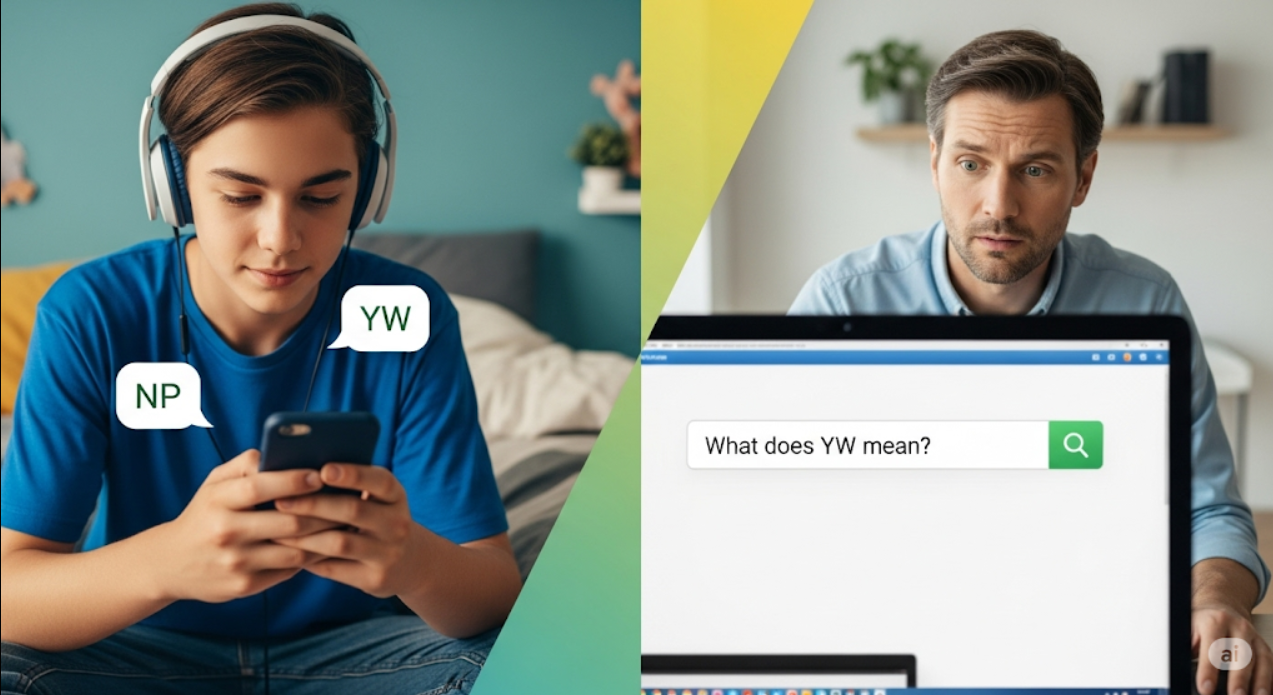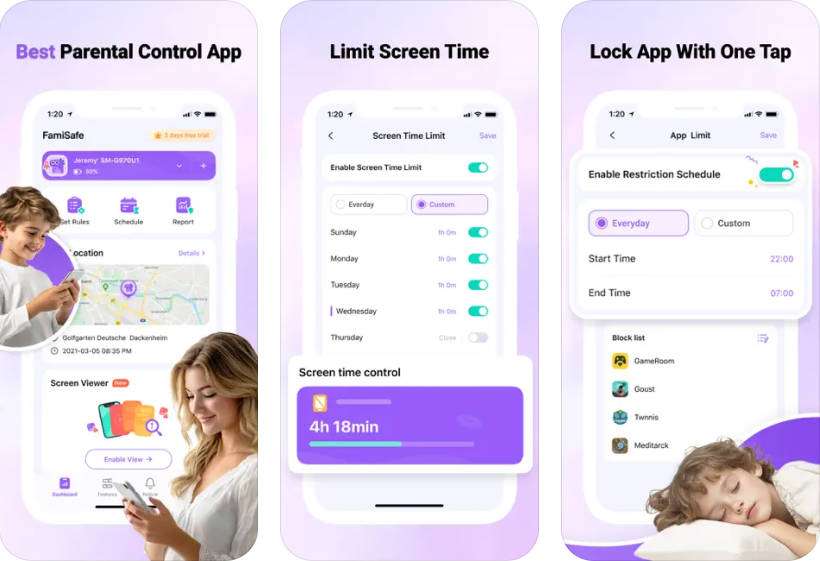When you glance at your teen's phone and see "yw" pop up on the screen, it might feel like you're missing part of the conversation. In most cases, YW means "you're welcome." Teens use it as a quick, polite reply when someone thanks them. But like many acronyms, the interpretation can change with tone and context. This guide decodes the YW meaning in text, explains what it means on Snapchat and other social media, explores its slang variations, shows how teens use similar courtesy abbreviations, and offers actionable advice for parents on monitoring slang and protecting kids' digital experiences.

In This Article
Part 1. YW Meaning in Text: Polite Shorthand
Across text messages, emails, and group chats, "YW" is an abbreviation for "you're welcome." It acknowledges thanks without needing to type out the full phrase. For example, if a classmate texts "thanks for the homework help," your teen might respond with "yw." This shorthand belongs to a family of courtesy abbreviations:
When to Use "YW" — It works best in casual conversations between friends, quick replies in group chats, and social media interactions where brevity keeps the flow going. Teens often use YW after abbreviations like "TY" or "thx" to keep the exchange light.
When to Avoid "YW" — For messages to teachers, relatives, or anyone outside a close circle, spelling out "You're welcome" is safer. Short replies can be misread as curt; clarity beats speed in formal or sensitive contexts.
Tip 💡
Coach teens to consider the audience. In professional or intergenerational chats, writing the full phrase "You're welcome" avoids misunderstandings.
Part 2. What Does YW Mean on Snapchat and Social Media?
On Snapchat, Instagram, TikTok, and similar platforms, YW still means "you're welcome." The fast, ephemeral nature of these apps encourages ultra‑brief messages, so YW fits seamlessly. In DMs or replies to stories, teens might say "yw" after someone thanks them for a compliment, tag, or helpful tip.
- Emoji for Warmth — Pairing YW with a friendly emoji softens tone and prevents sounding curt, e.g., "yw 😊" or "yw 👍".
- Platform Consistency — Whether it's written as YW or yw, the meaning typically doesn't change across platforms. That said, formality expectations do vary — what's fine in a Snap may feel too informal in an email.
- Formal vs. Informal — In professional spaces (school portals, part‑time job chats), the full phrase "You're welcome" is more appropriate.
Part 3. What Does YW Mean in Slang?
While "you're welcome" is the dominant definition, context can shift meaning in casual slang:
- "Yo, Wassup" — A playful greeting at the start of a chat.
- "Yes, Way" — A humorous reassurance when someone is skeptical.
- "Yeah, Whatever" — Rare, sarcastic usage (often with 🙄 or similar cues).
When a thread looks tense or sarcastic, ask your teen how it felt rather than guessing the slang's meaning. Try: "That chat seemed a bit off — everything okay?"
Part 4. How Do Teens Use YW and Other Courtesy Slang?
- Casual chats: After a meme or joke, "YW" acknowledges someone's thanks and keeps the conversation moving. 😄
- Homework help: A classmate's "Thanks!" often gets a quick "YW," signaling helpfulness without over‑explaining.
- Group planning: In fast‑moving group chats, short acknowledgments like "YW" or "NP" maintain pace and clarity.
- Sarcasm among close friends: Sometimes teens use "YW" jokingly when no one said thank you — common in trusted friend groups and usually harmless.
- Related courtesy abbreviations: NP ("no problem"), NVM ("never mind"), TIA ("thanks in advance"). Understanding these helps decode tone without overreacting.
Try FamiSafe to Monitor Risky Slang and Protect Your Child's Digital Life
Part 5. How Can Parents Spot Slang on Kids' Devices?
You don't need to memorize every acronym — focus on patterns and collaborative tools:
- Look for patterns, not one‑off words: Sudden waves of new slang late at night may indicate intense conversations when your child should be resting. Secretive language or frequent message deletion can also signal avoidance.
- Watch for risk terms: Mentions of self‑harm–related abbreviations (e.g., "kms") require immediate attention and support.
Use Technology as a Conversation Starter — Not a Wedge
FamiSafe helps parents stay aware without reading every message. The Explicit Content Detection feature monitors supported apps for suspicious words and sends alerts. You can add custom slang terms (like "yw", "kms", or new acronyms you notice) to get notified when they appear. Pair this with:

- Web Filter & SafeSearch — Block explicit content and risky categories.
- Screen Time — Set device-free hours for better sleep hygiene.
- Location & App Controls — See where kids are, block distracting or age-inappropriate apps.
Use these features with your teen's knowledge. Set shared goals (e.g., "no late-night messaging on school nights") and adjust together.
Encourage Open Communication
When you see unfamiliar slang, avoid interrogation. Try openers like: "I noticed 'yw' in your chat — what did it mean there?" or "How did that convo make you feel?" You'll learn more and build trust.
- Web Filter & SafeSearch
- Screen Time Limit & Schedule
- Location Tracking & Driving Report
- App Blocker & App Activity Tracker
- YouTube & TikTok History Monitor & App Blocker
- Social Media Texts & Porn Images Alerts
- Works on Mac, Windows, Android, iOS, Kindle Fire, Chromebook
Conclusion
Decoding teen slang doesn't require memorizing every acronym. Most of the time, YW simply means "you're welcome." Teens use it to keep chats efficient and friendly. On Snapchat and other social apps, the meaning stays the same, and adding an emoji can soften tone. Rarely, context can twist YW into sarcasm — read the room and ask how your teen felt about the exchange.
Your goal as a parent is to foster open communication and set sensible boundaries. Look for behavior patterns rather than reacting to single words. Tools like FamiSafe — with explicit‑content detection, web filtering, screen time, and app blocking — help you stay aware without invading privacy. Combine collaborative tech with empathy and respectful conversations to keep your child's digital world safer. 💜
FAQ
What does abbreviation YW mean?
YW is shorthand for "you're welcome," typically used after someone says thanks.
What does YW mean in texting and on Snapchat?
On SMS and Snapchat alike, YW means "you're welcome." The meaning is generally consistent across platforms.
What does YW mean in slang?
While it usually means "you're welcome," context can flip it to playful or sarcastic senses like "Yo, Wassup," "Yes, Way," or "Yeah, Whatever." Look at tone and surrounding messages.
Is YW appropriate with adults or teachers?
It isn't inherently rude, but it can feel too casual. In formal conversations, write out "You're welcome."



